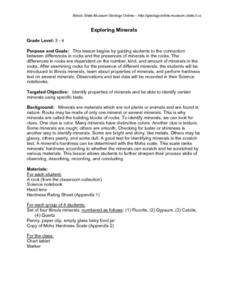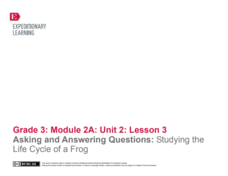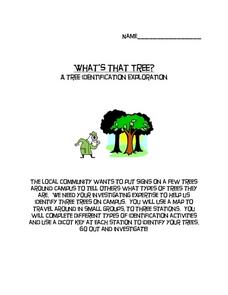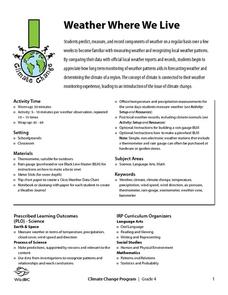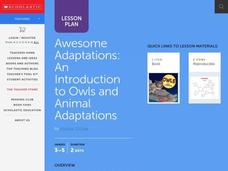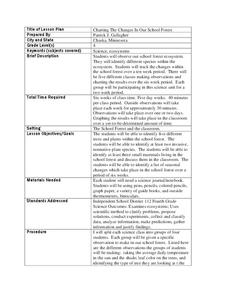Curated OER
Science Vocabulary game
Play a memory game with science vocabulary words to prepare for an upcoming test! Build both understanding and retention of new vocabulary words by setting up a matching game for your learners to play in small groups of three to five....
California Academy of Science
Kinesthetic Astronomy: Longer Days, Shorter Nights
A lamp, four globes, and some signs taped around the room are all you need to set up a solar system simulation for teaching how Earth's tilted axis creates the seasons. (Sticky dots are also needed, but not mentioned in the materials...
National Wildlife Federation
Massive Migrations
Turn your students into flocks of migratory birds for this fun lesson on animal migration. Prior to the activity, the teacher creates four different migration routes in the classroom or any available open space, labeling nesting...
Curated OER
Exploring Minerals
I love this geology lesson plan. Third and fourth graders look at the connections, and the differences, between rocks and minerals. Learners are charged with identifying specific rocks and minerals, learning how to properly use...
Safe Drinking Water Foundation
Water Pollution
An introductory lesson to a unit on water pollution, young environmentalists are asked to brainstorm examples of pollutants in water. This lesson will help develop a sense of what water pollution is and where the pollutants come from.
Curated OER
Science: Observing Fish Behavior
Students identify and explain various fish behaviors through observation. Over several months, they watch one fish in the classroom aquarium and record its behaviors in notebooks. They visit a virtual aquarium Website to find...
EngageNY
Asking and Answering Questions: Studying the Life Cycle of a Frog
A lesson challenges learners to ask and answer questions about the life cycle of a frog. With a class read-aloud, partner discussion, and notebook reflections, scholars complete a three-page worksheet to prove their understanding of the...
Center for Learning in Action
Properties of Balls
Enhance your states of matter lessons with a hands-on science investigation that compares six different balls' color, texture, size, weight, ability to bounce, and buoyancy.
Baylor College
Heart Rate and Exercise
What is the relationship among the heart, circulation, and exercise? Your class members will explore first-hand how different physical exercises affect an individual's heart rate. They will begin by learning how to measure their own...
Center for Learning in Action
Introduction to Matter
Begin your states of matter lessons with a demonstration designed to introduce the concept that all matter has properties. Reinforce this concept through vocabulary exploration, and the creation of atom models; salt, water, and carbon...
Center for Learning in Action
Investigating Physical and Chemical Changes
Super scientists visit ten stations to predict, observe, and draw conclusions about the physical and chemical changes that occur when different states of matter—liquid, solid, and gas—are placed under a variety of conditions. To...
Science Matters
Mighty Microorganisms
How can you tell if a microorganism is helpful or detrimental to an ecosystem? Learners inspect slides or pictures of microorganisms and record their observations to identify those that are beneficial or harmful. They then pretend to...
ReadWriteThink
Webcams in the Classroom: Animal Inquiry and Observation
Boost observational skills with an inquiry-based lesson that takes scholars on a virtual field trip. With help from webcams, learners observe animals in a zoo or aquarium. Observations go into a journal and a discussion is held to review...
Curated OER
What's That Tree?
Fifth graders identify trees along a nature trail. Using a dichotomous key, 5th graders answer questions to aid in their identification of trees along a specified nature trail. Observations are recorded in their science journals. Sample...
Baylor College
Body Strength
Your young learners will discover how muscular strength and endurance can increase with this truly hands-on activity! Beginning by writing an acrostic for the word strength, class members then engage in tracking their ability to squeeze...
Laboratory for Atmospheric and Space Physics
The Planets and Scale
Scholars gain an insight into the relative size of planets and distance between inner and outer planets with the help of informational text, a data table, and a series of four questions.
Wild BC
Weather Where We Live
Over a span of two weeks or more, mini meteorologists record weather-related measurements. What makes this particular resource different from others covering similar activities are the thorough details for the teacher and printables for...
Curated OER
Crazy for Cubes: Art and Science
Learners discuss Sol LeWitt and conceptual art, then analyze the differences in expressing a concept through model-based inquiry and aesthetic art criticism. They develop a geometric, scientific, or mathematical concept, then create an...
Scholastic
Awesome Adaptations
Engaged learners discover how an owl beak works and how animals adapt to their environment. This task is part one of a three-part series.
University of Minnesota
Bead Neuron
What do you call a skull without neurons? A no-brainer! A hands-on activity asks scholars to build a model of a neuron using beads. They use their models to study the parts of the neuron and their functions.
Curated OER
Communicating through Engineering Information Technology
Young scholars analyze prior labs by keeping a lab notebook. They share their lab notebook by electronically sending it to their classmates. Students demonstrate evaluation of other lab notebooks within the same classroom and those from...
Curated OER
Simple Machine Research
Fifth graders demonstrate the ability to use scientific skills and Processes to describe forces that act upon objects to cause specific changes in motion. They identify and describe a science problem related to forces and simple machines.
Curated OER
Charting the Changes in Our School Forest
Fourth graders investigate the ecosystem and how forests are disappearing. In this environmental protection lesson, 4th graders analyze the changes in their school for 2 weeks. Students practice identifying trees, birds, and foliage...
Alabama Learning Exchange
Light Reflection and Absorption
Students discover what types of objects reflect and absorb light. In this science inquiry activity, students use flashlights to determine whether different objects absorb or reflect light.





